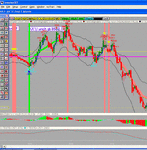Alex,
I use deal4free to swing trade indices as well, mainly the S&P 500 and Nasdaq Composite as they seem to suit my current system well at the moment. (I say 'at the moment' cause as far as I know no system works for very long, unfortunately! But it's on my website if you're interested.)
Anyway, like you say it takes a wee while to bend your brain around the initially intimidating d4f platform but it is one of the best out there and designed with common sense to the fore. You'll need a reasonably specified PC and ideally broadband internet to run it smoothly though.
A couple more random warnings, sorry if they sound patronising, but I made all these mistakes when I was learning:
Watch out for your stops triggering unwanted trades - this can happen if you close a position and forget to remove the stop that was associated with it as the stop will not automatically disappear when you close a position. This applies to limit orders as well.
Keep an eye on the notional size of your positions as the quotes can be a touch misleading.
e.g Vodafone is quoted at say 125.50 and you buy £10 a point. If it goes up to 126.50 bid you win £10.
But if the S&P 500 is quoted at say 999.5 and you buy £10 a point and it goes up to 1000.5 you win £100, not £10, despite the decimal point being in the same place.
Or in other words before betting £x a point make sure it's not a much larger or smaller position than you intended.
Be aware of the difference between controlled risk stops and normal stops.
A normal stop is not guaranteed, i.e in a fast moving market the price can plough through your stop, causing a fill at a price less favourable than you had planned for. A controlled risk stop, for which you pay a small spread premium, is guaranteed to be filled at the level you chose, even if, say, the market drops 500 points overnight on catastrophic news.
In markets that are quoted by d4f 24 hours, such as the FTSE, Dow and S&P normal stops are generally safe as any news will trigger an immediate movement in the quote. But in markets that are only quoted during trading hours you could get yourself into a lot of trouble with a normal stop as the market could open ("gap") up or down a massive amount, miles from your stop.
Avoid the temptation to overtrade. All those flashing prices on the d4f screen can be addictive and lead one into foolish, impulsive trades out of boredom. If you are swing trading and not spending every day in front of the PC this shouldn't be such a problem.
Avoid taking a market view. Instead ask "What is it doing now?" If it is trending jump in until it isn't trending anymore. Follow its lead, don't try to make it follow yours.
And for what it's worth a few of my favourite aphorisms -
Look after your losses and the profits will take care of themselves.
Do not confuse intelligence with a bull market.
Be patient and wait for the market to come to you.
Trade well, not necessarily often.
Cut losses quickly and enjoy it. A small loss often results from a good trade. Take profits slowly, but lock part of them in with trailing stops.
Never let a profit become a loss.
Never increase a loss by moving stops.
If in doubt get out.
Risk and money management are more important than trading systems. Paper trade until you have a proven track record.
Ignore technical analysis at your peril, but be aware it sits awkwardly somewhere between art and science.
Do not let ego and emotion cloud judgement.
Though you may strongly feel otherwise, the market is always right.
Don't believe the rubbish peddled by the financial services industry and media.
The trend, often just a rough, obvious line scrawled on a chart, is a lifelong ally - always try to tag along with it.
Read 'Trading for a Living' by Dr. Alex Elder.
Although it is occasionally acceptable to ease into a position in small chunks (e.g buy £2 a point at 100, 97 and 95) provided of course you have stop loss (e.g at 90 in this example) do not ever be tempted to average down. "Economic history is a never-ending series of episodes based on falsehoods and lies, not truths. It represents the path to big money. The object is to recognise the trend whose premise is false, ride that trend, and step off before it is discredited." (Soros)
"Markets can stay irrational longer than most of us can remain solvent". (Keynes)
Phew! Sorry to overload you with yet more information. Keep us posted as to your progress, questions, thoughts etc. - tis what this fine site is for after all.
Good luck 🙂

